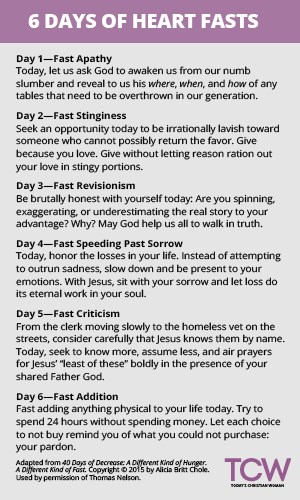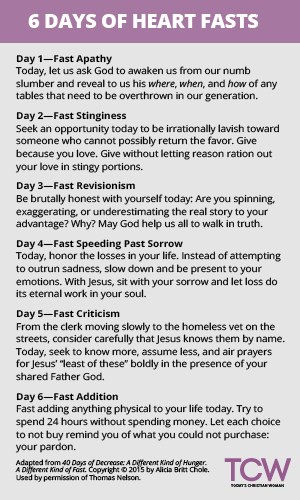A Different Kind of Fasting

The mounting anticipation surprised me. Placing my hand upon the heavy wooden door, I opened it, stepped inside, and stood still. An invitation sounded in my soul. This was unexpected . . . and this was holy. Suddenly, the tiny stone-floored chapel became a sanctuary for me.
Though the chapel was empty, I was not alone. Slowly, I walked toward the cross and sat down on the front pew. With journal in hand, my very first fast commenced.
Questions had taken me there. But it was love that would keep me there. What occurred through my fasting Friday upon Friday, month upon month, captivated me. My hunger for answers waned as my hunger for God grew.
Through fasting, God fed my love for him. Over time, fasting transitioned from an answer-quest to a soul-feast.
Fasting Seeks God, Not Answers
In the beginning, each weekly luncheon fast began with a question: “God, what is my next step?” The question pounded loudly in my heart and in my head. But within a month, the question quieted. Perhaps the greatest—and most glorious—shock during that year was how direction decreased in importance to me.
Through the fast, Jesus won my heart at new depths. Waiting upon him shifted from a strenuous but necessary prelude to the love-thick main event.
Yes, I did emerge from that season knowing the next step for my future, but it came at me sideways, more as a gift than as the object of pursuit. As I focused on worshiping my eternal God instead of being stressed over my temporal needs, and as I invested in thoughtful reading of his Word, some desires naturally became lighter while others gained weight. It seemed as though God were placing his hand upon the latter and lodging them deeply, like anchors, within my soul.
Fasting Is Motivated by Love
Decades later, fasting is a staple in my spiritual diet. And I’ve learned that in order to address fasting, I must first address love. Why? Because fasting is a spiritual discipline, and spiritual disciplines are holy only when their inspiration and destination is love for God.
Certainly fasting—a discipline of decrease and self-denial—can have physical benefits whether or not it is motivated by love. But only love can transform disciplines into worship. Without love, disciplines are dead: measurable but not meaningful to God.
Fasting done for any reason less than love for God will result in something far less than worship. In the same way that self cannot satisfy self regardless of how often it feasts, self cannot starve self regardless of how frequently it fasts. Only love can make fasting spiritually fruitful. Without love, fasting will quickly descend into an arrogant form of asceticism, a bumbling attempt at bribery, or sheer frustration. And that kind of fast will not be acceptable to God.
Fasting Is Relational
Fasting is not just about us; it is about God. We must understand that fasting is relational.
The first three occurrences of the word fast in Scripture emphasize a healthy fusion of fasting and fellowship. Fasting is first mentioned as a means to discernment (Judges 20:26–27), a method of repentance (1 Samuel 7:6), and a manifestation of mourning (1 Samuel 31:13).
Over time, however, fasting seems to have suffered a loveless mutation. Around 711 B.C. God issued a commanded correction in Isaiah 58:3–5:
“We have fasted before you!” they say.
“Why aren’t you impressed?
We have been very hard on ourselves,
and you don’t even notice it!”“I will tell you why!” I respond.
“It’s because you are fasting to please yourselves.
Even while you fast,
you keep oppressing your workers.
What good is fasting
when you keep on fighting and quarreling?
This kind of fasting
will never get you anywhere with me.
You humble yourselves
by going through the motions of penance,
bowing your heads
like reeds bending in the wind.
You dress in burlap
and cover yourselves with ashes.
Is this what you call fasting?
Do you really think this will please the LORD?”
In Isaiah’s day, fasting had somehow decayed from a form of fellowship into a form of manipulation: God’s people were fasting to be seen by God, to be noticed by God, so that they could get what they wanted from God. In his rebuke, God disconnected fasting from food and self and reconnected fasting with faith and community as he called them to fast injustice, oppression, greed, and apathy (Isaiah 58:6–8).
Evidently, fasts that are acceptable to God are fueled by love for God and manifest in love for humankind. Think of fasting as a campfire on a cold night: Self-denial is the wood; love for God is the fire; and God, his people, and the lost are those warmed by the offering.
So, are you thinking of fasting from social media or designer coffee for Lent? Then do so for the love of God: Meditate on the love that led Jesus cross-ward and devote the saved time or money to a local shelter.
Is your church beginning a Daniel fast to intercede for your community? Then join them for the love of God: As you discipline your appetite, meditate on Christ’s wilderness temptations.

Is it in your heart to fast from accumulation in honor of the underserved? Then do so for the love of God. Let each choice to not buy remind you of what you could not purchase: your pardon.
Fasting Thickens Communion with God
Decades after my first steps into that tiny stone chapel, I continue to incorporate a day of fasting into each week. Sometimes it is a 12-hour fast and other times it is a 24-hour fast. Sometimes it is a water-only fast and other times a veggie-juice-only fast. Sometimes I simply journal and paint, and other times I invest the space in intercessory prayer.
Whatever the format, each love-motivated fast is a response to two passages:
One day the disciples of John the Baptist came to Jesus and asked him, “Why don’t your disciples fast like we do and the Pharisees do?” Jesus replied, “Do wedding guests mourn while celebrating with the groom? Of course not. But someday the groom will be taken away from them, and then they will fast.” (Matthew 9:14–15)
The Spirit and the bride say, “Come.” Let anyone who hears this say, “Come.” Let anyone who is thirsty come. Let anyone who desires drink freely from the water of life. (Revelation 22:17)
Ultimately, I fast because I thirst: I thirst to love Jesus more. As I explain in 40 Days of Decrease, “My annual fasts, seasonal 40-day fasts, and weekly 12- to 24-hour fasts are more love offerings than disciplines, though it certainly requires discipline to maintain them. In short, I ache. I ache for my Bridegroom. I ache to live every waking moment conscious of his presence. I ache to live aware of his past and present suffering. I ache to live unattached to what man counts and measures.”
When it comes to fasting, why is weightier than what. Let us fast with love as our inspiration and our destination. Let us thin our lives in order to thicken our communion with God.
Dr. Alicia Britt Chole is a speaker, leadership mentor, and author of 40 Days of Decrease (Thomas Nelson, January 2016). She is the founding director of a mentoring nonprofit, Leadership Investment Intensives, Inc. Follow her on Twitter at @aliciachole or at her website AliciaChole.com.
Read more articles that highlight writing by Christian women at ChristianityToday.com/Women
 Read These Next
Read These Next

 No One Dreams of Being a Single MomLet’s love rather than label.
No One Dreams of Being a Single MomLet’s love rather than label.
 Avoiding the CrossIt’s so much easier—and less painful—not to think about the reality of what Jesus went through. And yet, it’s essential.
Avoiding the CrossIt’s so much easier—and less painful—not to think about the reality of what Jesus went through. And yet, it’s essential.
 The Real Meaning of ModestyHint: It's not about sexual temptation.
The Real Meaning of ModestyHint: It's not about sexual temptation.








 Homepage
Homepage
